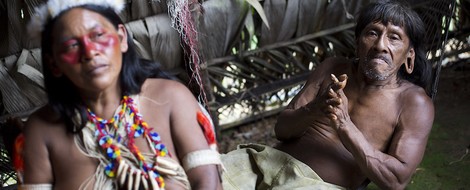Your podcast discovery platform
Curious minds select the most fascinating podcasts from around the world. Discover hand-piqd audio recommendations on your favorite topics.

piqer for: Climate and Environment
Pamela works as a Press & Communications Manager for an international NGO (IWGIA) defending indigenous peoples' rights. She holds an Erasmus Mundus MA in Journalism, Media & Globalisation from Hamburg and Aarhus University and an MA in Political Science from the University of Buenos Aires. She will be putting the eye on international media coverage of indigenous communities and their demands.
Illegal Logging And Hunting Corner Isolated Tribes in Ecuador
Exactly where the Ecuadorian Amazon meets the border with Peru, illegal extraction has been affecting the lives of indigenous peoples in isolation since the 80s.
In case you wonder who these communities are, they are defined as groups of indigenous peoples that do not maintain sustained contacts with the majority non-indigenous population, and generally reject any type of contact with persons not part of their own people.
In Ecuador, indigenous peoples in isolation happen to live in an area relatively undisturbed, thus targeted by illegal loggers and hunters. Their well-being and survival are the responsibility of the state, through the Ministries of Justice and Environment.
This piece explains how the intrusion of the illegal camps poses a risk to indigenous peoples living close to the border areas. What for? Peccaries and cedar, which is a type of wood valued in the market at around 3,000 dollars the cubic foot.
According to the author, the increase of extractive activities in the area is directly related to the recent demilitarization and cease of government monitoring activities.
What is in the outlook then?:
"Experts fear that outside pressures to which the isolated indigenous groups are subjected in the Intangible Zone will trigger new massacres and heighten the risk of extinction of these populations"
